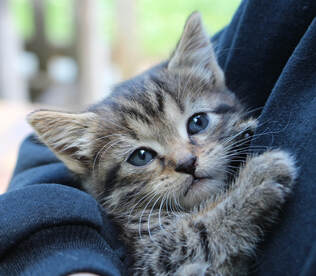Laurie Anne Walden, DVM Photo by Lucas Ludwig Photo by Lucas Ludwig Pets need stool tests to screen for parasites or help find the cause of diarrhea and other digestive system problems. Collecting a stool sample at home is the least stressful option for the pet. The alternative is for someone at the veterinary clinic to use a loop to remove a little bit of stool from the rectum. This option yields a much smaller sample and can be unpleasant for the animal. A fecal test for parasites involves mixing the stool sample in a flotation solution and either spinning it in a centrifuge or leaving it to sit in a vial for a certain amount of time. The material at the top of the solution is then removed to a microscope slide to look for parasite eggs that have floated to the surface. Sometimes a tiny bit of stool is smeared directly onto a microscope slide for examination. Fecal analysis can also include chemical tests. For all of these tests, the stool needs to be fresh and squishy enough to mix or smear. The age and condition of a stool sample affect the results. Parasite eggs can dry out or hatch in old stool. Hard, dry feces is very difficult or impossible to prepare for testing. Stool that has been sitting outdoors for a while can contain fly eggs or larvae (maggots). Liquid diarrhea that’s soaked into paper or cloth can’t be mixed in solution to test for parasites. Here’s how to collect a stool sample to get the most accurate results:
Photo by Lucas Ludwig on Unsplash Laurie Anne Walden, DVM Photo by Haley Owens Photo by Haley Owens Socializing young kittens and puppies means giving them positive experiences with things they’ll encounter throughout their lives. Building positive associations early in life helps animals feel comfortable with new people and new situations. Animals that are well socialized when they’re young are less likely to develop fear-based behavior problems (like aggression) that could put them at risk of being sent to a shelter or euthanized later on. Sensitive Period for Socialization For kittens, the window of opportunity for socialization is very early: from 3 weeks to about 7 to 9 weeks of age.[1,2] The sensitive period is the time when a young kitten’s brain is most receptive to socialization. During these early weeks, a kitten is exploring and learning, developing neurological pathways that will help the kitten learn in the future. After the sensitive period, brain development shifts; kittens don’t make positive associations as quickly or easily and they’re more likely to be afraid of new things. This is why it’s so difficult, if not impossible, to convert a semi-feral adult cat into a cat that can be happy living as a house pet. You will have noticed that the sensitive socialization period for kittens is nearly closed by the time they’re typically adopted or purchased. Socialization needs to start with the person caring for the mother cat and newborns. When you adopt or buy a kitten, continue providing socialization (at the kitten’s comfort level and pace) to reinforce what the kitten has already learned. The socialization process should always be positive. Don’t force kittens to interact with strangers or other animals if they’re shy, and don’t push them to be near things that scare them. Let them choose whether to interact. Give them room to walk away and let them hide if they want to. Use positive reinforcement (food or play) to encourage them to interact and build their confidence. The following suggestions are adapted from the American Veterinary Medical Association.[1] For more tips, check out the First Year of Life page on the Cat Friendly Homes website: https://catfriendly.com/life-stages/first-year-life/ Socializing Kittens Before Weaning
Socializing Kittens 8 to 12 Weeks Old
Older Kittens and Newly Adopted Adult Cats
References 1. Welfare implications of socialization of puppies and kittens. American Veterinary Medical Association. June 9, 2015. Accessed July 8, 2022. https://www.avma.org/resources-tools/literature-reviews/welfare-implications-socialization-puppies-and-kittens 2. Todd Z. The sensitive period for socialization in puppies and kittens. Companion Animal Psychology. July 26, 2017. Accessed July 8, 2022. https://www.companionanimalpsychology.com/2017/07/the-sensitive-period-for-socialization.html Photo by Haley Owens on Unsplash |
AuthorLaurie Anne Walden, DVM Categories
All
Archives
June 2024
The contents of this blog are for information only and should not substitute for advice from a veterinarian who has examined the animal. All blog content is copyrighted by Mallard Creek Animal Hospital and may not be copied, reproduced, transmitted, or distributed without permission.
|
- Home
- About
- Our Services
- Our Team
-
Client Education Center
- AKC: Spaying and Neutering your Puppy
- Animal Poison Control
- ASPCA Poisonous Plants
- AVMA: Spaying and Neutering your pet
- Biting Puppies
- Boarding Your Dog
- Caring for the Senior Cat
- Cats and Claws
- FDA warning - Bone treats
- Force Free Alliance of Charlotte Trainers
- Getting your Cat to the Vet - AAFP
- Holiday Hazards
- How To Feed Cats for Good Health
- How to Get the Most Out of your Annual Exam
- Indoor Cat Initiative - OSU
- Introducing Your Dog to Your Baby
- Moving Your Cat to a New Home
- Muzzle Training
- Osteoarthritis Checklist for Cats
- What To Do When You Find a Stray
- Our Online Store
- Dr. Walden's Blog
- Client Center
- Contact
- Cat Enrichment Month 2024
|
Office Hours
Monday through Friday 7:30 am to 6:00 pm
|
Mallard Creek Animal Hospital
2110 Ben Craig Dr. Suite 100
|
Site powered by Weebly. Managed by IDEXX Laboratories

 RSS Feed
RSS Feed